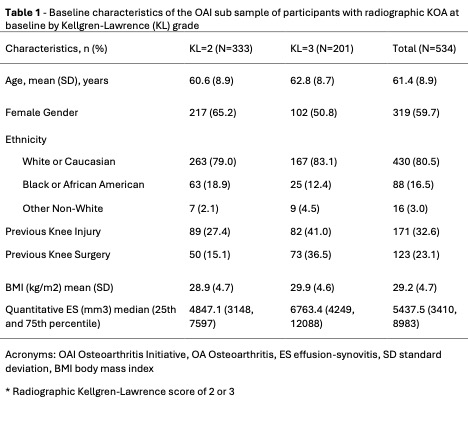Session Information
Session Type: Poster Session C
Session Time: 10:30AM-12:30PM
Background/Purpose: Even though knee pain is ubiquitous in knee osteoarthritis (KOA) patients, currently there are limited treatment options which are only minimally or moderately efficacious for relieving pain and may lead to undesired side effects. Effusion-synovitis (ES) is present during all stages of OA and has been reported to be associated with increased knee pain. Though the validated WOMAC-Pain subscale was the primary assessment tool in most of these studies, it was used as a composite measure (i.e., only the total score was reported) so the associations between ES and pain during specific types of activities are unknown. Therefore, the main objective of this study is to evaluate the longitudinal associations between MRI-detected quantitative ES (qES) and self-reported total and activity-specific knee pain.
Methods: This study included a random longitudinal subsample of Osteoarthritis Initiative (OAI) participants with diagnosed radiographic KOA (Kellgren-Lawrence [KL] grade 2,3) who had both X-ray and MRI assessments of both knees at baseline (n = 534). Our primary outcome was self-reported knee pain in the past 7 days, reported at baseline, 12-, and 24-month visits for each knee. Knee pain was measured using the WOMAC-Pain and Knee injury and Osteoarthritis Outcome Score (KOOS) Pain subscales. The questions on both subscales were scored from 0-4, which correspond to: None (0), Mild (1), Moderate (2), Severe (3), and Extreme (4). Our primary exposure was whole knee joint qES, assessed on non-contrast enhanced 3T MRI at baseline, 12-, and 24-month visits. Total qES volume (mm3) was measured using our semi-automated multi-planar MRI quantification approach. We applied generalized estimating equations to evaluate the association between qES and the individual items of both subscales. These models were fitted using a multinomial distribution with a cumulative logit link function and unadjusted and adjusted odds ratios (ORs) with corresponding 95% confidence intervals (CIs) were reported. We adjusted for age, gender, ethnicity, previous knee injury/surgery, BMI, and KL grade. The ORs and adjusted ORs and their associated 95% CIs were reported per a 5000 mm3 increase in qES.
Results: Whole-knee ES was significantly associated with the total WOMAC-Pain subscale score in the unadjusted and adjusted models. As shown in Figure 1, participants with greater qES had higher odds of experiencing worse knee pain (OR: 1.43 [1.15,1.77], adjusted OR: 1.37 [1.09, 1.70]). Regarding pain with specific activities, qES was significantly associated with knee pain at night while in bed (OR: 1.22 [1.08, 1.38], adjusted OR: 1.22 [1.08, 1.37]) and when going up or down the stairs (OR: 1.22 [1.08, 1.38], adjusted OR: 1.21 [1.07, 1.37]), as also shown in Figure 1. There was no significant association between pain with the three KOOS-specific activities and qES (Figure 2).
Conclusion: For KOA patients, longitudinal whole-knee qES was significantly associated with total WOMAC-Pain and particularly with knee pain during bedtime and climbing stairs. Our whole knee qES measure may be valuable for patient screening/phenotyping and outcome assessment in KOA trials.
To cite this abstract in AMA style:
Robles D, Gilles G, Christiansen N, Grawer L, Jayyusi K, Shaikh A, Tang R, Taljanovic M, Duryea J, Bedrick E, Kwoh C. Estimating the Association between Effusion-synovitis and Knee Pain in a Subset of Participants with Radiographic Knee Osteoarthritis: Data from the Osteoarthritis Initiative (OAI) [abstract]. Arthritis Rheumatol. 2025; 77 (suppl 9). https://acrabstracts.org/abstract/estimating-the-association-between-effusion-synovitis-and-knee-pain-in-a-subset-of-participants-with-radiographic-knee-osteoarthritis-data-from-the-osteoarthritis-initiative-oai/. Accessed .« Back to ACR Convergence 2025
ACR Meeting Abstracts - https://acrabstracts.org/abstract/estimating-the-association-between-effusion-synovitis-and-knee-pain-in-a-subset-of-participants-with-radiographic-knee-osteoarthritis-data-from-the-osteoarthritis-initiative-oai/


.jpg)
.jpg)